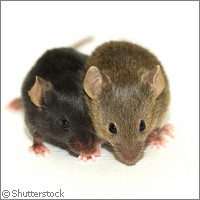Happiness hormone crucial for mouse survival, EU-funded research finds
EU-funded researchers in Germany have found that mice without serotonin (commonly known as the 'happiness hormone') in their brains have impaired growth, disturbed sleep, reduced breathing and heart rate, as well as a tendency to fight with other mice and eat their young. The study, published in the Proceedings of the National Academy of Sciences, provides new insights into the importance of the serotonin system. The new findings, by Dr Natalia Alenina and colleagues from the Max Delbrück Center for Molecular Medicine, are an outcome of the FUNGENES ('Functional genomics in engineered ES cells') project, which was financed with EUR 8.5 million under the 'Life sciences, genomics and biotechnology for health' Thematic area of the Sixth Framework Programme (FP6). The project partners studied mouse embryonic stem cells in an effort to improve our understanding of both cellular self-renewal and the processes by which tissue-specific cells are differentiated. Serotonin is a signalling molecule that is synthesised from tryptophan (the amino acid found in turkey and milk that makes you sleepy). This process is kicked off by an enzyme called tryptophan hydroxylase (TPH), and two forms of this enzyme occur in all animals: TPH1 and TPH2. These 'isoenzymes' are encoded by two distinct genes. Studies of TPH1 have shown that it produces the serotonin that circulates outside the central nervous system (CNS); this serotonin is involved in a wide range of processes, from bone formation to liver regeneration and hepatitis. The other isoenzyme, TPH2, is known to be responsible for initiating the production of serotonin within the CNS, specifically in the raphe nuclei of the brainstem. Previous studies of TPH2 have linked mutations in the gene that encodes this enzyme to neurological and brain abnormalities. In the current study, the researchers bred mice that did not have this gene; the animals (dubbed Tph2-/-) produced almost no CNS serotonin. Dr Alenina and her colleagues made several discoveries. First, they confirmed that 'TPH2 is the major enzyme responsible for serotonin synthesis in the brain', and that under normal conditions, circulating serotonin cannot enter the brain. Observations of the Tph2-/- mice over time revealed that the animals could survive to adulthood, were fertile, and that the females were able to produce milk and feed their pups on day one. Surprisingly, they also found that levels of other neurotransmitters such as dopamine were unaltered in these mice compared to control animals. But the lack of CNS serotonin caused the Tph2-/- mice to suffer from 'impaired early postnatal growth and altered autonomic control of sleep, breathing, thermoregulation, heart rate, and blood pressure'. In early life they were smaller and weaker than control pups, but vocalised just as well when separated from their mothers. As adults they slept a lot more than control mice and were aggressive; the females fought with other mice and cannibalised most of their pups. In fostering experiments, the Tph2-/- mice also ate pups born to 'normal' mice. The mice without CNS serotonin could sniff out a hidden cookie, but they were unable to collect their scattered pups in under 30 minutes. The control mice, in contrast, found their pups in about four minutes. 'It has been shown that maternal neglect can go along with aggressiveness in mice,' the study observes, 'and, indeed, we observed a more pronounced aggressive behaviour of female and male Tph2-deficient mice compared to controls. Even females housed with Tph2-/- females were often wounded by fighting that never happens in control animals of the same genetic background. These observations are consistent with the hypothesis that increased aggression is associated with states of low serotonergic system activity.' The study concludes that 'TPH2-derived serotonin is involved in the regulation of behaviour and autonomic pathways but is not essential for adult life.' The researchers suggest that future studies of mice recently bred to lack both TPH1 and TPH2 will help to further clarify 'the functional importance of the serotonin system as a whole'.
Countries
Germany



